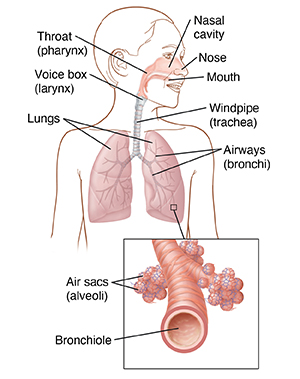Anatomy of the Respiratory System in Children
What is respiration?
Respiration is the act of breathing in and breathing out. When you inhale, you take in oxygen. When you exhale, you give off carbon dioxide.
What makes up the respiratory system?

The respiratory system is made up of the organs involved in the interchanges of gases. It consists of the:
-
Nose
-
Mouth
-
Throat (pharynx)
-
Voice box (larynx)
-
Windpipe (trachea)
-
Airways (bronchi)
-
Lungs
The upper respiratory tract includes the following:
-
Nose
-
Nasal cavity
-
Sinuses
The lower respiratory tract includes the following:
How do the lungs work?
The lungs take in oxygen. The body's cells need oxygen to live and carry out their normal functions. They also get rid of carbon dioxide, a waste product of the cells.
The lungs are a pair of cone-shaped organs made up of spongy, pinkish-gray tissue. They take up most of the space in the chest, or the thorax (the part of the body between the base of the neck and diaphragm). The lungs are covered in a membrane called the pleura. They are separated from each other by the mediastinum. This area contains the following:
The right lung has 3 lobes. The left lung has 2 lobes. When you breathe, the air:
-
Enters the body through the nose or the mouth.
-
Travels down the throat through the voice box (larynx) and windpipe (trachea).
-
Goes into the lungs through tubes called main-stem bronchi:
-
One main-stem bronchus leads to the right lung and one to the left lung
-
In the lungs, the main-stem bronchi divide into smaller bronchi
-
Then the bronchi divide into even smaller tubes called bronchioles
-
Bronchioles end in tiny air sacs called alveoli. This is where oxygen is taken into the blood and carbon dioxide is put into the lungs to be exhaled.
Online Medical Reviewer:
Deborah Pedersen MD
Online Medical Reviewer:
Jessica Gotwals RN BSN MPH
Online Medical Reviewer:
Marianne Fraser MSN RN
Date Last Reviewed:
1/1/2023
© 2000-2025 The StayWell Company, LLC. All rights reserved. This information is not intended as a substitute for professional medical care. Always follow your healthcare professional's instructions.